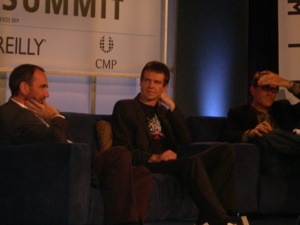"The Pirate and the Suit" at Web 2.0

This afternoon at Web 2.0 in San Francisco, John Battelle brought together David Munns, vice chairman of EMI Music worldwide and chairman and CEO of EMI Music North America, and Eric Kleptone of the Kleptones. EMI has been on the front lines of the mashup wars, first with D.J. Danger Mouse's Gray Album, and more recently with the Kleptones' A Night at the Hip-Hopera. My takeaway from the session is that while things are changing in the music industry, those changes are externally driven and the odds of the industry voluntarily participating in a frictionless mashup economy remain very long.

The beginning of the discussion focused on EMI's reaction when they learned of the Kleptones' runaway hit (which mashed up Queen's "A Night at the Opera" with rap and other more contemporary cultural music references): "We broke out the rifles, formed a posse..." This got the intended laugh, but the message David Munns tried to convey was that the times they are a changin':
We realized it was pretty creative, very interesting, the consumers liked it. After we got over the 'what have then done to our beautiful Queen record,' we began to think about whether and how we should get paid for it. And that's still ongoing. We're opening to licensing for things like this. This kind of thing is becoming part of our business.
Well and good, but a systemic mechanism for change is not yet in place. John Battelle pointed out the irony of Eric Kleptone's situation when he realized his work was being very well received: "Here's an artist with a hit, and he has to take out his checkbook because of it." According to Eric, the perfect world for an artist like him would involve a platform that included all the music you might want to sample, and some kind of streamlined payment structure (subscription or otherwise).
EMI's David Munns seemed to think however that such licensing decisions will continue to take place on a case-by-case basis, and in John Battelle's words, "to get all the people in the music business to agree to something like that would be akin to achieving peace in the Middle East."
The discussion turned to DJ Dangermouse's Gray Album, and why the reaction to that was so severe (though as John pointed out, not terribly effective). Said David: "I don't want to sound like the bad guy, but we're not here particularly to win a popularity contest." The Beatles didn't like their album being "messed around with" without their being involved. When John pointedly asked "What's the damage?" from something like the Gray Album or A Night at the Hip-Hopera, David didn't identify any, responding instead with, "It's not a question of damage, it's a question of rights."
That comment basically encapsulates the rest of David's side of the discussion. He tried to emphasize how fast changes have occurred and continue to occur, and that his industry's motto is "consumers getting music what they want, where they want, and how they want." But to back up his statement that EMI recognizes "it's not just about selling flat things with a whole in the middle anymore," he cited the company's name change from "EMI Records" to "EMI Music." More palpable proof would have been more receptivity to the suggestions Eric and John made regarding creating a viable economy around remix culture, and to the fact that the technology industry is well equipped to help the music industry solve the complexity and volume issues — David said there are 57 million individual transactions involved in every million dollars EMI makes — inherent in creating such an economy.